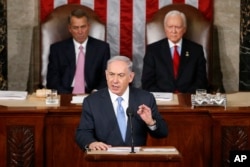Iranian Foreign Minister Javad Zarif says international economic sanctions on Iran will be lifted Saturday, with the United Nations nuclear watchdog agency expected to confirm that Tehran has complied with last July's landmark agreement with world powers to restrain its nuclear development program.
"Today is a good day for the people of Iran and the sanctions will be lifted today," Zarif told Iran's IRNA news agency as he arrived in Vienna, awaiting the release of the final report by the International Atomic Energy Agency. "It's also a good day for the region."
The top Iranian diplomat met with the European Union foreign policy chief, Federica Mogherini, on implementation of the Iranian nuclear deal negotiated over two years between Tehran and the United States, Britain, China, France, Russia and Germany. In the July 14 pact, Iran agreed to curb its nuclear program in exchange for the lifting of sanctions against Tehran that have hobbled its economy.
Frozen assets
With removal of the sanctions, Iran immediately will gain access to about $100 billion in assets frozen overseas and reopen its doors to world trade with international corporations selling cars, airplanes and other major items it needs to support a nation of 80 million people.
Tehran says it plans to swiftly ramp up its oil exports, within weeks adding another 500,000 barrels a day to a global oil glut that has plunged oil prices on international markets to below $30 a barrel for the first time in 12 years. Iran says that within a year its oil exports could total a million barrels a day.
Zarif and Mogherini were to meet with U.S. Secretary of State John Kerry Saturday. The three are expected to make a joint statement.
IAEA statement expected
The IAEA had been expected to soon officially announce that Iran has complied with its commitment to curtail its nuclear program, clearing the way for the lifting of international sanctions.
Under last year's agreement, the Islamic Republic agreed to scale back its uranium-enriching activities and submit to inspections in exchange for the rollback of sanctions.
U.S. State Department spokesman Mark Toner said that the meeting in Vienna is in line with the agreement's Joint Plan of Action (JCPOA).
"As we've said, all parties have continued making steady progress towards Implementation Day of the JCPOA, which will ensure the exclusively peaceful nature of Iran's nuclear program," Toner said.
White House spokesman Josh Earnest said Friday the United States is aware that Iran has made important progress in fulfilling commitments in the agreement, but that Iran will not receive any sanctions relief until the IAEA confirms commitments and compliance.
He said this includes shutting down "every pathway that Iran has obtaining fissile material it has," as well as eliminating 98 percent of its uranium stockpile. He said most importantly, there will be ongoing monitoring of Iran's nuclear program. "We have the ability to snap sanctions back in place," he said.
Deal opposed by Israel
Israeli Prime Minister Benjamin Netanyahu has been among the most vocal opponents of the deal negotiated with the United States and other world powers. He said it would not slow Tehran's work toward a nuclear weapon and would put Israel in danger. He highlighted his concerns in an address to the Republican-controlled U.S. Congress in March during a trip in which he did not meet with U.S. President Barack Obama.
Diplomatic sources told the French news agency, AFP, Friday that everything was being put in place so that the European Union, along with the United States and United Nations, can end the sanctions regime on what is known as "Implementation Day" for the July agreement.
Their comments came one day after Iran said it had removed the core of its Arak heavy water nuclear reactor and filled in part of it with cement, meaning it cannot be used to produce a nuclear weapon.
Iran has said its nuclear program is for peaceful purposes. Sanctions have blocked Iran from at least $50 billion in frozen assets.
VOA State Department Correspondent Pam Dockins contributed to this report.














